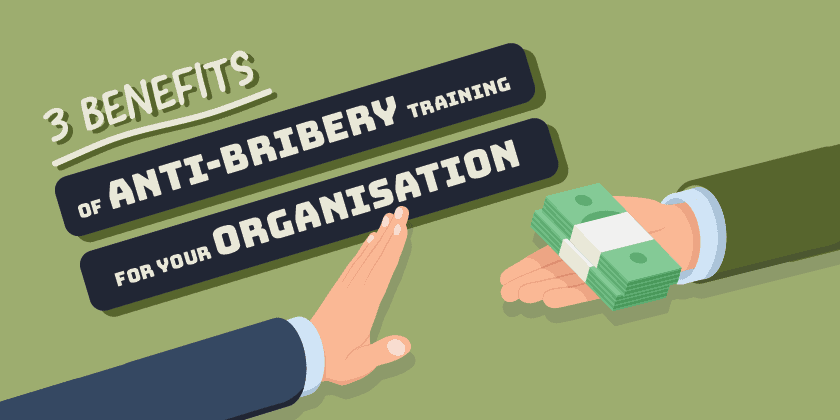3 Benefits Of Anti-Bribery
Bribery is one of the most well-known and widespread forms of corruption. It exists in all parts of the world and can pose a serious threat to the integrity of on organisation.
We tend to think that bribery just affects the big multinational companies and that it has no relevance to us in our day to day lives but the effects of corruption can be profound. It can erode our trust in political and economic systems, institutions, leaders and have a knock-on effect on people’s personal lives.
Bribery and corruption are endemic in large swathes of the world and it’s seen as a justified way to secure competitive advantage in business.
The World Bank estimates that over $1 Trillion is paid annually in bribes and according to the UK government, the UK is one of the most attractive destinations for laundering the proceeds of corruption. The National Crime Agency believes that up to £90 billion of illicit funds are laundered through the UK each year.
How can bribery affect my business?
This illegal and unethical practice could pose a serious risk to your organisation if an employee was found guilty of committing a bribery offence.
The UK Bribery Act 2010 defines bribery as giving or receiving a financial or other advantage where the intention is to encourage the recipient to perform improperly an official or business function or action.
Bribery doesn’t necessarily have to mean a cash payment, it can take many forms including lavish gifts, holidays, entertainment, tickets to an event or something as small as a case of wine.
Organisations need to tread very carefully to ensure that a simple gift to a client is not misconstrued as a backhanded bribe.
The UK Bribery Act 2010 was seen as a benchmark legislation and was designed to help eradicate bribery and corruption and promote business protection. Organisations need to ensure their employees are up to speed with the act and become fully aware of the implications it could have on their business.
The consequences for organisations involved in bribery include; substantial fines, imprisonment, termination of contracts and significant reputational damage. Within the UK, failure to prevent bribery can result in fines of up to 10% of turnover and being prohibited from tendering for European Union public contracts.
It’s essential that organisations have the right training in place to ensure that staff can identify potential bribery situations and follow the correct procedures to demonstrate compliance.
Benefits of Anti-bribery Training for your Organisation
1. Educated Workforce

Anti-bribery training will ensure that staff are fully educated on what bribery is, the different forms it can take, the implications of committing bribery and how an offence can be reported.
For anti-bribery training to be effective, it needs to resonate with staff. Employees need to be able to relate to the material being presented in their training or implementation will not be effective.
eLearning provides one of the most efficient and cost-effective ways to train staff on bribery and corruption. Employees can learn through small sharp bursts which greatly enhances their ability to absorb the training material.
Through the use of engaging content and role-based scenarios, staff gain a greater knowledge about bribery and the risks it poses to their organisation. At the end of each training course, employees will complete a test to demonstrate their understanding of what bribery is and the importance of acting ethically when conducting business.
Effective and engaging training will reduce the likelihood of staff falling foul of the legislation.
2. Compliance with Anti-Bribery and Anti-Corruption Laws

Many organisations do not consider themselves at risk of bribery but it’s vital they are compliant with anti-bribery and corruption laws. Anti-bribery training is a necessity, and this is especially true for organisations that are operating in a global marketplace.
Effective Anti-bribery compliance training will ensure that staff can:
- Describe and understand The UK Bribery Act 2010, Foreign Corrupt Practices Act and other applicable local laws
- Identify different types of bribery particularly the distinction between hospitality and bribes
- Understand the criteria for adequate procedures to ensure compliance
- Awareness of the penalties for bribery and corruption
- Awareness of responsibility to report concerns and instances of bribery
- Understand the implications of bribery on your organisation and society at large
3. Creates a Culture of Integrity


Effective Anti-bribery training will ensure that staff are equipped with all the skills and knowledge necessary to promote and ensure integrity within the workplace. The success of an organisation is built off the trust of customers, employees and the general public, and the best way to gain this trust is to demonstrate ethics and integrity in all business practices.
Regular training will provide staff with a thorough understanding of the policies and legal requirements necessary for an ethical workplace and highlight the importance of their role in preventing bribery and corruption.
MetaCompliance‘s anti-bribery eLearning is suitable for any professional and will educate users on the key threats and methods used to report or raise concerns in relation to bribery. The training courses look at the current Anti-bribery legislation including the UK Anti-Bribery Act, the Foreign Corrupt Practices Act, US specific law as well as other legislation. Get in touch for further information on how we can help you implement Anti-bribery training within your organisation.







